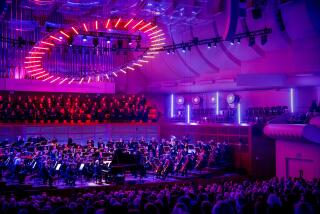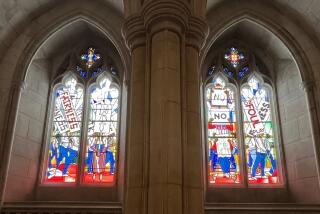Earthly Sounds, Not of This World
Ingram Marshall’s music is that of a rolling stone that gathers moss. It is as if he chooses something--a phrase he has recorded (in one case a Danish woman’s voice reading the weather conditions in Greenland), an oboe d’amore playing a memorable snippet of Bach, something from Sibelius--and then tosses it out into a new environment. With the aid of subtle and often subversive electronics, the original music echoes back richer, having picked up other music and sounds--crickets, the ringing of an Indonesian gamelan--along the way. The result is not just beautiful in its lapping atmospherics, but, in its repetition combined with unpredictability, downright addictive.
Listen to the recent orchestral work “Kingdom Come” on the Nonesuch disc and feel urban tension slip away. This is what New Age music would love to be if it weren’t so simplistic.
Marshall, who was in the first class of CalArts in the early 1970s and who roomed with composer John Adams in San Francisco after that, has followed through on the promise of a certain kind of repetitive electronic music, music made from seeing where recorded samples might lead. Adams also explored this terrain, but not with the same persistence. The early electronic works on the New World disc are a fascinating example of that technique in its purer form. But with his more recent efforts, Marshall demonstrates how he has branched out, using electronically altered instrumental music to enter new dimensions.
“Dark Waters” for English horn and tape does that with Sibelius, and its companion piece for Van Cleve, “Holy Ghosts” for oboe d’amore and live digital delay processing, leads you into a whole new universe of Bach.
The Nonesuch disc could well become the breakthrough recording for Marshall. The title piece, “Kingdom Come,” is Sibelius’ “Swan of Tuonela” on steroids, bravely swimming into dark, irresistible waters and unimagined worlds. Every time I hear it, I immediately want to start it over (and usually do). But that is not to say that the two other pieces on the Nonesuch disc aren’t exceptionally captivating as well.
“Hymnodic Delays” puts early music, sung by Theater of Voices, through gorgeous contortions. In “Fog Tropes II,” undulating music for the Kronos Quartet is joined with pre-recorded nature sounds to produce misty mystery. Certainly there are bolder uses of electronics than Marshall’s, but as far as I know, his are the most enchanting on the planet. And of the planet.
More to Read
The biggest entertainment stories
Get our big stories about Hollywood, film, television, music, arts, culture and more right in your inbox as soon as they publish.
You may occasionally receive promotional content from the Los Angeles Times.











